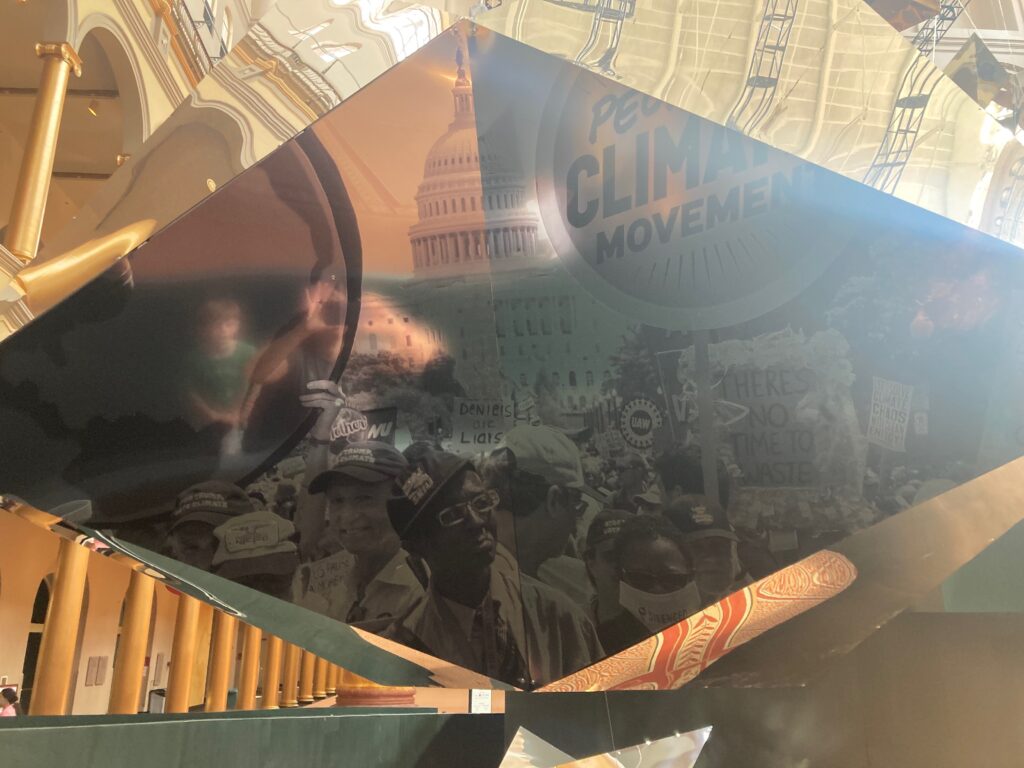
I stared at my face being reflected back at me from a shining silver surface. Beyond my reflection, there was a photograph laser-etched in black that felt very familiar. Activists of all ages and races yelled and held signs declaring the “People’s Climate Movement” in front of the U.S. Capital.
“I was at this event! Heck, you were at this event!” I exclaimed to my seven year old. We were at an exhibit called “Look Here” at the National Building Museum (shush, it’s much cooler than it sounds). The piece of art combined giant kaleioscopic sculptures with huge metal versions of childhood fortune tellers. Some of the fortune tellers had surfaces printed with photos of historic events in Washington D.C. Other ones featured the 1964 March on Washington and the AIDS quilt.
But to see this one – a photo my kids and I could have been in – was startling. It put us in the company of other people marching on Washington who made history. We were part of that group. We were part of history.
But isn’t everything we do history being made?
As a quote from writer and civil rights activist Layla Saad says, “We’re living within history as well. You are a part of history.” Or as someone on the ShowerThoughts Reddit account pointed out, time travel stories present the danger of going back in time as changing a small thing and having it have a big impact. But no one ever considers the future impact of small actions today.
The knowledge that we’re part of history in the making carries both responsibilty and comfort.
The responsibility is sort of obvious. We have the responsiblity to make those small changes that can snowball into big, important ones. To show up to the protest. (Or at least the ones you can.) To swap out driving with biking or walking when you can – which might be the very thing your neighbor needs to not complain about future bike lanes. To call your Congressperson, which might be the one statement that pushes their vote over the edge. To install those solar panels that might inspire your neighbor to do so as well.
We have the responsibility to act on climate change as a responsibilty to our children and all children. In an essay in the book All We Can Save, Amy Westervelt points out that climate action and being a good parent aren’t separate – taking action is creating a safer, more just world for our children. It’s part of parenting, not apart from it.
But there’s also comfort in the knowledge that we are making history. It’s easy to lose track of the big picture when you’re in the middle of crisis. It’s easy to forget that there are wins ahead when there’s so much to lose. It feels like you aren’t doing anything, that all of your work may be a waste. I’m sure it felt that way some days when police were beating up Civil Rights protestors or when people were dying of a devestating disease and the government refused to do anything about it. I’m sure it felt like the frustation and despair would never end.
And yet, those things made a difference. They moved laws, policies, and social attitudes. They made measurable, drastic differences in the world. They saved people’s lives.
Maybe what you do won’t have as big of an impact, but it does have one. We can take refuge in the idea that other people took action despite terrible odds and yet moved the agenda forward. We are too. Every Congressional member you call, every protest you go to, every person you talk to – it all counts.
And who knows, maybe one day you’ll see yourself reflected back in history.